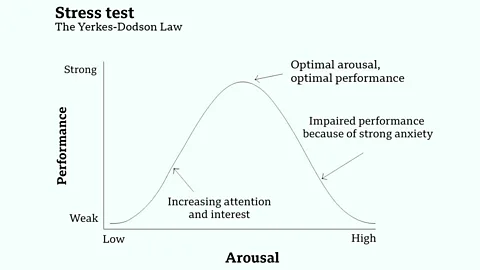Is stress good or bad? It’s actually both
 Getty Images
Getty ImagesA 100-year-old ‘law’ suggests stress can be both an intellectual and physical performance enhancer – but only up to a point. So how can you find the sweet spot?
With offices closed in nations around the world, many of us are grappling with how to stay productive and on task as we work from home. To help provide insight on how to manage this, BBC Worklife is updating some of our most popular productivity stories from our archive.
Like many emergency responders, Nicholas Groom is used to stress at work. He speaks quickly, with an urgency that seems appropriate for a paramedic. “We’re a bit of a weird group because we voluntarily go into situations that other people run away from,” says 29-year-old Groom, a trustee for the College of Paramedics who lives in Oxfordshire, England. “You’ve got to like stress and pressure to an extent.”
On one hand, the stress can be helpful. “I find that when attending a serious incident, having some stress helps my decision-making, because it helps to maintain a focus on the situation,” Groom says. “Having you ‘on your toes’ slightly helps to remain aware of changing circumstances around you.”
On the other hand, the work can be highly pressurised. “Too much stress causes what we call cognitive overload and then impairs your ability to make decisions because you’ve lost that situational awareness,” he adds.
 Getty Images
Getty ImagesGroom is not alone in his complicated relationship with stress. Many people work best under pressure or assume that others do. But can stress really help you do better and if so, how much is the right amount?
The ‘law’ of stress
Many people believe in a Goldilocks approach to stress. Too much, and you become overwhelmed. Too little, and you’re unmotivated. After all, some anxiety is motivating; think of the adrenaline before a deadline or the excitement before a competition.
“It’s highly functional, which is why stress is really importantly implicated in performance and in health,” comments James C Quick, a management professor at the University of Texas at Arlington. “It’s very helpful for legitimate emergencies, and to achieve peak achievement in high-performance events.” Sports fans sometimes even talk about a “clutch gene” in athletes who seem to play best in the climactic final moments of a match.
Though clearly there’s no gene for it, the relationship between performance and pressure is such a well-established psychological principle that it’s been enshrined as the Yerkes-Dodson Law. This law is named after two psychologists whose influential 1908 study found that mice were faster at learning a task (which of two boxes to pick) if they received a “disagreeable electric shock”. A “moderate” shock led to faster learning than either the “mild” or “extreme” shock. Similar results have been seen in studies on other animals – thankfully not always involving electric shocks.
The 1908 paper focused on habit formation rather than stress and didn’t extend to human behaviour. But in the decades that followed, the body of research influenced by the paper gradually attained the status of “law”. It’s generally interpreted as meaning that performance increases with arousal but only up to a point, a relationship often depicted as an inverted-U curve. (The “stress” and “arousal” are often used interchangeably.)

Quick explains that in physiological , arousal might take the form of an increased heart rate, redirected blood flow to the brain and large muscle groups, and release of glucose to act as fuel. The body’s resources are reallocated to be most useful for an emergency, from greater mental alertness to higher muscle tension. The brain and body are essentially bracing themselves.
This is helpful in a genuine crisis or in response to an interesting challenge. Under-arousal is a problem, after all. As Quick mentions, both “insufficient boredom and challenge lead to low levels of performance and achievement”. Having too little to do is demoralising, but so is feeling overextended. Finding the balance is key.
Why the type of stress matters
While the Yerkes-Dodson principle appears to resonate with many, there has been plenty of criticism of it too. Detractors suggest it is applied too broadly.
Studies on the relationship between stress and performance show that outcomes depend on a complex array of factors. These include how performance is measured and the nature of the stressor. Sleep deprivation might harm speed, but not accuracy (so a sprinter shouldn’t stay out late every night). Noise might hurt accuracy, but not speed (so a reporter should try to find a quiet space).
And this broad brush doesn’t reflect the nuances of an individual’s goals and personality, such as introversion. For instance, some people may be galvanised by pressure because they’re “defensive pessimists” who perform better when they worry a bit. Others find positive reinforcement more motivating.
Of course, any stress can cause harm when it’s prolonged. To take just one example, a chronically high heart rate is linked to cardiovascular risk. And additional stressors, such as financial pressures or psychiatric issues, clearly affect how beneficially someone can respond to stress.
Crystal Wernicke, 30, has always used stress as a motivator. As a bored schoolgirl, and then Disney World employee, she created pressure-filled ways to keep herself interested, like cramming for exams or taking on extra responsibilities at work. “People have a negative mentality when it comes down to stress,” she says. “But I think it can be utilised as a tool if it’s done properly.”
 Getty Images
Getty ImagesBut juggling parenting, a full-time job, a voluntary role and financial troubles that left her temporarily living out of her car became too much. Eventually this led to a two-month period of illness, an autoimmune disorder triggered by stress. Now a full-time software engineering student, Wernicke is trying to re-engineer her relationship with stress – and change lifelong habits.
How to best use Yerkes-Dodson
So is there a way to harness stress to your advantage while being mindful of its detrimental long-term effects?
One key factor is to avoid, where possible, the tipping point when stress leads to burnout. Burnout, with its physical and mental harms, is especially likely when stress is chronic. In Groom’s case, while short-term spikes of stress in emergency situations may have helped him do his job better, he found night shifts gruelling. “By the end of my shifts I’d feel like I had a sleep hangover and need two days to recover,” he says. After he began exhibiting comion fatigue, he changed his work pattern and found from colleagues.
Another factor is the presence of control. For those who feel powerless over their situation, stress is unlikely to be beneficial. Studies show that acute, uncontrollable stress limits the functions managed by the prefrontal cortex, which is responsible for working memory (and thus reasoning and decision making). But with some autonomy over stressful tasks, mice and humans alike are better able to convert that pressure into higher performance.
Research by Sian Beilock, a cognitive scientist and the president of Barnard College, shows that the role of working memory differs depending on the task. For a pressurised intellectual activity like an examination, test-takers are likely to choke if they worry because worrying depletes working memory. For a high-pressure physical activity like a big sports match, performance anxieties can translate into paralysing hyper-awareness of what’s going on physically. So the test-takers should try not to deplete their precious working memory by worrying, and the athletes should focus on outcomes (e.g. where the ball should be going) rather than on their bodies.
 Getty Images
Getty ImagesBeilock also found that how people interpret their bodily responses to stress could change how they perform. When she and her colleagues examined STEM test anxiety among secondary school students, they found that students from higher-income families were more likely to believe that a little stress is motivating.
Beilock’s research suggests that students from lower-income families may score better on such tests if they’re encouraged to see their bodily responses – the sweating palms, beating hearts and all the rest – as positive.
When it comes to stress and how it affects your performance, it’s helpful to recognise the variations in personality, type of stress and task that affect where you sit on the bell curve, as well as understanding tools you can use to control or harness that stress.
Ultimately, it’s not helpful to take a one-sided view, either demonising or glorifying stress. As Quick sums up: “Stress can be the kiss of death as well as the spice of life.”
